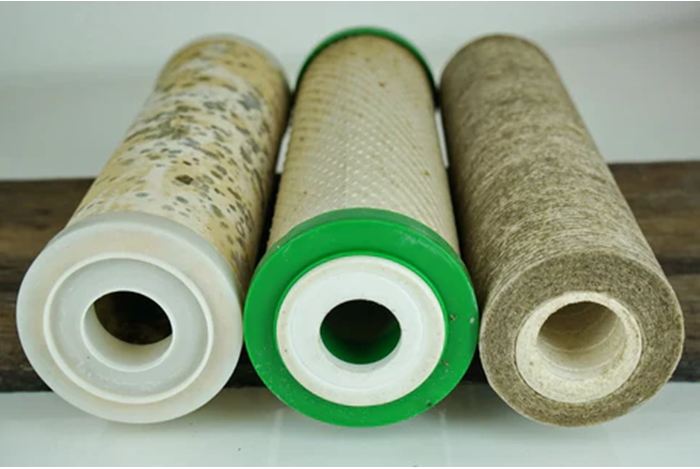Reverse osmosis filters have emerged as the most popular type of water filtration system in recent years. This is so because they remove several toxic contaminants and impurities from the water while improving its overall taste and odor.
This is why more and more people are installing them in their homes. However, many people need clarification on how long reverse osmosis filters last. They ask this question to determine whether purchasing them will be worth it.
In this blog post, we will detail how long RO filters last. We will also cover some tips to maximize the lifespan of these filtration systems. So, without discussing any other info, let’s get started.
Contents
How long do reverse osmosis (RO) filters last?
We have researched that the average lifespan of reverse osmosis filters is between 2 and 5 years. However, it is essential to note that this figure can vary depending on the factors discussed below.
1. Water quality:
The quality of water that is being filtered with the help of the RO filter has a significant effect on its overall lifespan.
Suppose the water is too polluted with toxic impurities such as heavy metals, sediment, etc. In that case, its filters will quickly become clogged and need replacement compared to the RO filtration system, which treats less contaminated water.
2. Usage:
The usage of the RO filtration system can also impact its overall lifespan. Using the filtration system to continuously filter large amounts of water will require frequent replacements due to high demand.
On the other hand, if the reverse osmosis filter is not frequently used, it will not require quick replacement or maintenance, resulting in an increased lifespan.
3. Care:
If a reverse osmosis filter is cared for correctly, like cleaning, sanitizing, etc., it will affect its overall lifespan and filtration capabilities.
So, these factors play a crucial role in increasing or decreasing the longevity of the RO filters.
The lifespan of reverse osmosis water filters varies depending on their type. For instance, sediment RO filters usually have an average 6-12 months lifespan.
How You Can Maximize the Lifespan of Your RO Filtration System
You can efficiently maximize the lifespan of your reverse osmosis filters in several ways. Some of the most effective ones are discussed below in detail.
1. Regular replacement of filters:
RO water filtration system consists of multiple filters known as “Pre-filters” and “Post-filters.” Both are responsible for eliminating many hazardous contaminants and impurities from the water.
However, with time, the tiny pores of these filters become clogged due to regular filtration. The clogging directly affects the filtration ability of the RO filter and, ultimately, its lifespan.
That’s why it is recommended to replace it when needed. But now the question is, how can you know that filters need replacements? Multiple signs will give an indication to you regarding the filter replacement; those signs are listed below:
- The quality of the filtered water will be reduced.
- Less water flow rate
- Unusual noises from the system while operating.
2. Cleaning and sanitizing:
This is yet another way through which you can increase the overall lifespan of your RO filter. Regularly cleaning and sanitizing the system prevents the buildup of impurities, debris, and other things that can significantly affect both teams’ performance and lifespan.
However, it is essential to note that you should follow the manufacturer’s instructions to clean and sanitize the filtration system. Some general steps of the cleaning and sanitization process are:
- Cut or turn off the main water supply.
- Release any pressure or water stored in the faucet by opening it.
- Remove the filter housing and then all the pre and post-filters.
- Start cleaning the housing with a bush along with light-warm water.
- Sanitize the housing with diluted bleach solution.
- Now, efficiently soak the filters in a cleaning solution.
- Rinse all components of the system with neat water.
- Reassemble all the pieces back into the system.
- Open the tap and check whether everything is working fine or not.
3. Select the RO filter at a friendly place:
You should protect your reverse osmosis filtration system from direct sunlight, extreme temperatures, etc., because these can degrade the system’s components and reduce lifespan. That is why you should select an environment-friendly place for the installation.
How can you select the right place? You must find an excellent, dark location like a garage, store room, etc. Along with you, please choose a stable and smooth place so the filtration system can get damaged.
4. Follow manufacture guidelines for maintenance and usage:
This is the final way to maximize the longevity of your filtration system. It is recommended to adhere to the manufacturer’s guidelines regarding use and maintenance. Along with this, you should also follow proper care for smooth operation. With this approach, your filtration system will have an increased lifespan.
Frequently Asked Questions
What is the average lifespan of RO filters?
As mentioned above, the average lifespan of RO filters is between 2 to 5 years.
Can I increase the lifespan of my reverse osmosis filter?
Yes, with proper care and maintenance, you can quickly increase the longevity of your reverse osmosis filtration system.
Wrapping up
Reverse osmosis (RO) filters are the most well-known and widely used filtration systems because they can remove several impurities from the water.
However, people often ask how long they last to determine their worth. This blog has explained how long these filters last and some that affect their longevity. Please find this article helpful.
Good luck, Habibi!
Come to the website and explore some mind-blowing content.











